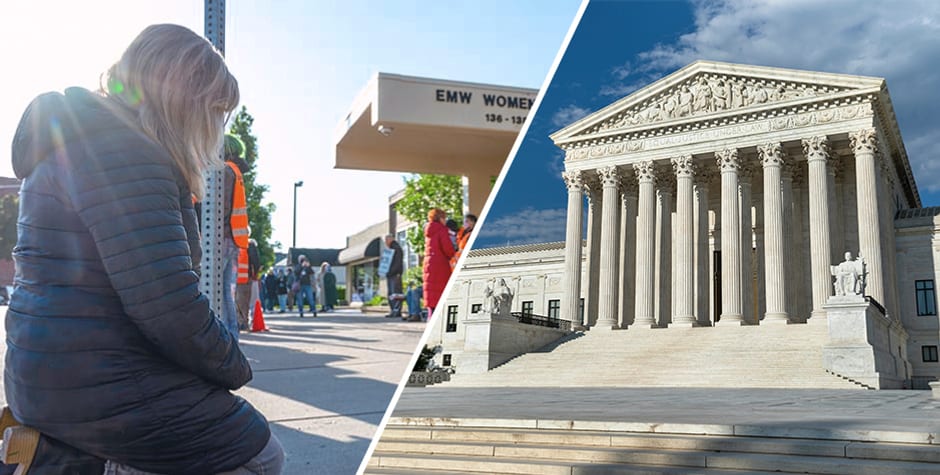ACLJ Takes Sidewalk Counseling Case to U.S. Supreme Court
Listen tothis article
The ACLJ’s ongoing fight to uphold the free speech rights of sidewalk counselors is now at the U.S. Supreme Court. Our case, Turco v. City of Englewood, N.J., poses a critical constitutional question: Do buffer zones around abortion clinics infringe on the First Amendment rights of sidewalk counselors?
That’s the very issue we’ve brought to the Court today in our petition for a writ of certiorari. The petition asks the Court to resolve two questions: (1) Whether Englewood’s speech-free buffer zone ordinance violates the First Amendment, and (2) Whether the Court should overrule Hill v. Colorado (an oft-criticized decision of the Supreme Court that upheld floating bubble zones around persons within 100 feet of a healthcare facility).
From the start, the ACLJ has fervently defended pro-life speech, especially the free speech rights of sidewalk counselors. Our client, Jeryl, and counselors like her engage in gentle, personal dialogues with women entering abortion clinics, providing them with alternative options and support. These counselors operate from a place of deep concern for women and the unborn, striving to present information and care that are not available within abortion clinics.
This case began in 2013 when Englewood (“City”) adopted an ordinance regulating speech activities in buffer zones near health care and transitional facilities. The ACLJ challenged the City’s ordinance in 2014, arguing that the law was excessively broad and unconstitutional, drawing on the Supreme Court’s ruling in McCullen v. Coakley, which unanimously struck down a similar law.
Our case saw an initial win in the trial court, but that decision was overturned by the Third Circuit Court of Appeals, leading to a bench trial in February 2022. During the trial, Jeryl highlighted the challenges the buffer zones created for her counseling efforts. The City, however, justified its ordinance on grounds of financial constraints and confidentiality. The district court ruled in favor of the City in August 2022, a decision later upheld by the Third Circuit, citing the Supreme Court’s Hill decision as a basis for its ruling. In affirming the trial court’s decision, the Third Circuit failed to note that the Supreme Court described Hill as a distortion of First Amendment doctrines just a year before.
The Third Circuit also failed to consider another federal court of appeals’ decision involving a similar law. In Sisters for Life v. Louisville-Jefferson County, a case where the ACLJ represents two sidewalk counselors, the Sixth Circuit ordered the district court to enter a preliminary injunction against Louisville’s buffer zone law around all health care facilities.
As we argue in our petition, the Third Circuit’s decision cannot be allowed to stand. The government’s authority to regulate protected speech activities on public sidewalks is sharply circumscribed. Before the government can enforce speech-free zones in public areas, it must first try other ways to address its concerns, such as prosecuting lawbreakers, seeking injunctions against bad actors, and enforcing conduct-based laws already on the books. As the Sixth Circuit said in Sisters for Life, “Solving policy problems by regulating speech is a means of last resort, not first resort.” The Supreme Court in McCullen was also clear: “A painted line on the sidewalk is easy to enforce, but the prime objective of the First Amendment is not efficiency.”
In this case, where Englewood has sacrificed the right to free speech in the name of efficiency, the Supreme Court must intervene. Jeryl is not alone. Other federal courts, in addition to the Third Circuit, have dismissed challenges against speech-free zones outside abortion clinics. The problem is that those courts are hamstrung by the Supreme Court’s decision in Hill. While that decision has been criticized by Justices over the years, including current Justices, the Court has yet to overturn the decision. Our petition argues that now is the time, and this is the case, for the Court to do just that.
The Supreme Court is not required to grant our petition, and the Court rarely grants them. Here, however, considering the conflict among the lower courts and the ongoing mischief Hill continues to create, we believe our petition is more than worthy of Supreme Court review.
The ACLJ has always been committed to protecting the right to free speech, advocating not only for clients like Jeryl but also for all individuals engaged in peaceful expression in public spaces. Should the Court grant our petition, a decision on the merits will have far-reaching implications for how free speech is protected across the country. And that is not all. A positive decision from the Court in this case will allow sidewalk counselors to continue their important mission of supporting women and their unborn children at the very spot where that message can have its greatest power.
Once the City files its opposition to our petition and we file our reply, the Court will decide whether to take the case. We will keep you posted on when that happens.
